The topic of feline flatulence, often overlooked yet significant in understanding our cats' health, unveils intriguing facets of their physiology. Experts in animal biology confirm that cats do indeed pass gas, sparking curiosity about the frequency and implications of this natural occurrence.
By unraveling the complexities of cat farting, from the role of diet to the influence of gut microbiota and external factors on fart odor, a deeper understanding of our feline companions emerges.
Stay tuned to discover practical insights into managing and potentially mitigating your cat's gas-related issues, offering a glimpse into a lesser-explored aspect of feline well-being.
Key Takeaways
- Cats fart 1-2 times a day due to diet and gut bacteria.
- Factors like stress and diet changes can increase cat farting.
- Cat fart smell is influenced by their carnivorous diet.
- Managing cat farting may require a diet adjustment or vet consultation.
Cat Fart Frequency
Discussing the frequency of cat farting highlights the minimal occurrence of this natural bodily function in feline companions. Cats typically fart 1-2 times a day on average, showcasing their efficient energy production mechanism and diet composition. Unlike animals such as cows, cats have fewer gut bacteria, contributing to their lower farting frequency.
Factors like swallowing air while eating or excess gas from gut bacteria can lead to occasional farts in cats. Stress, anxiety, or dietary changes may also impact the frequency of cat farting. Monitoring your cat's farting habits can provide insights into their digestive health, ensuring they remain comfortable and content.
Impact of Diet on Farting
The dietary choices made for cats play a significant role in influencing the frequency and intensity of their flatulence. When it comes to cat farting, what they eat can make all the difference. Here are three key points to consider:
- Protein vs. Fillers: Cats are obligate carnivores, meaning their digestive systems are designed for a protein-based diet. Fillers like carbs and veggies can lead to smelly poop and farts, as these are harder for cats to digest efficiently.
- Commercial Cat Foods: The ingredients in commercial cat foods vary widely, affecting the smell of their farts. Opting for biologically appropriate diets can result in odorless poop and farts, whereas certain diets may make cat farts and poop smell worse.
- Diet Transitions: A sudden change in diet can cause increased gas in cats. Gradual food transitions can help reduce farting issues and maintain digestive health.
Gut Bacteria Comparison
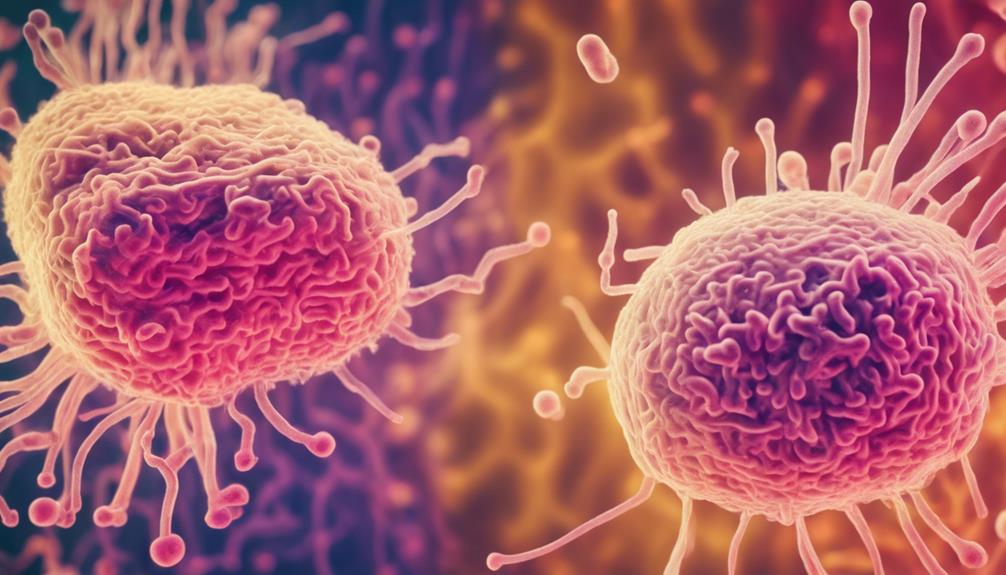
When examining the digestive systems of cats and other animals, a notable point of interest lies in the comparison of their gut bacteria composition. Cats, being obligate carnivores, have a simpler gut microbiome compared to herbivores like cows, which have more diverse and abundant gut bacteria to aid in breaking down plant material.
The gut bacteria in cats primarily assist in digesting proteins and fats from their meat-based diets. This streamlined bacterial community reflects the evolutionary adaptation of cats to efficiently process animal tissues.
Understanding these differences in gut bacteria composition between cats and other animals sheds light on the unique nutritional requirements and digestive capabilities of our feline companions.
Air Swallowing and Gas
Air ingestion and the accumulation of gas in cats can contribute to various digestive issues and discomfort. When it comes to your feline friend, understanding the reasons behind their air swallowing and gas buildup is essential for their well-being. Here are a few things to consider:
- Eating Habits: Cats that eat too quickly may swallow excess air, leading to gas buildup.
- Stress and Anxiety: Just like humans, cats can swallow air when they are stressed or anxious, causing discomfort.
- Dietary Factors: Certain foods can produce more gas in cats, so being mindful of their diet can help reduce flatulence.
Factors Influencing Fart Smell
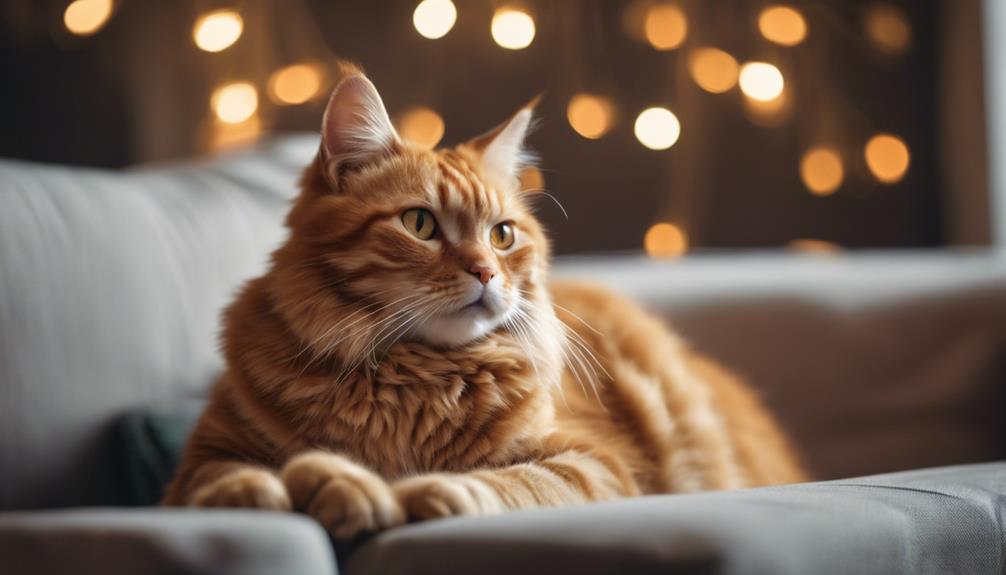
Understanding the factors that influence the smell of a cat's farts is crucial for maintaining their digestive health and overall well-being. The smell of a cat's fart can be influenced by various factors, with diet playing a significant role.
Cats being obligate carnivores, their bodies are designed to break down protein-based diets efficiently. Fillers like carbs and veggies can lead to smellier farts and poop. Commercial cat foods with different ingredients can also impact fart smell. Opting for biologically appropriate diets can result in less odorous poop and farts.
Conversely, certain diets may exacerbate the smell of cat farts and poop. Monitoring and adjusting your cat's diet can help manage and potentially improve the smell of their farts.
Protein-Based Diet Importance
A key aspect in maintaining a cat's digestive health and overall well-being is the significant importance of a protein-based diet.
Why is a Protein-Based Diet Important for Cats?
- Biological Need: Cats are obligate carnivores, meaning they require a diet high in animal protein to meet their nutritional needs adequately.
- Muscle Maintenance: Protein is essential for muscle development, strength, and repair in cats, ensuring they stay active and healthy.
- Digestive Health: A protein-rich diet supports a cat's digestive system, promoting proper nutrient absorption and reducing the likelihood of gastrointestinal issues.
Ensuring your feline companion receives a balanced diet rich in high-quality proteins is crucial for their overall health and happiness.
Fillers and Smelly Farts
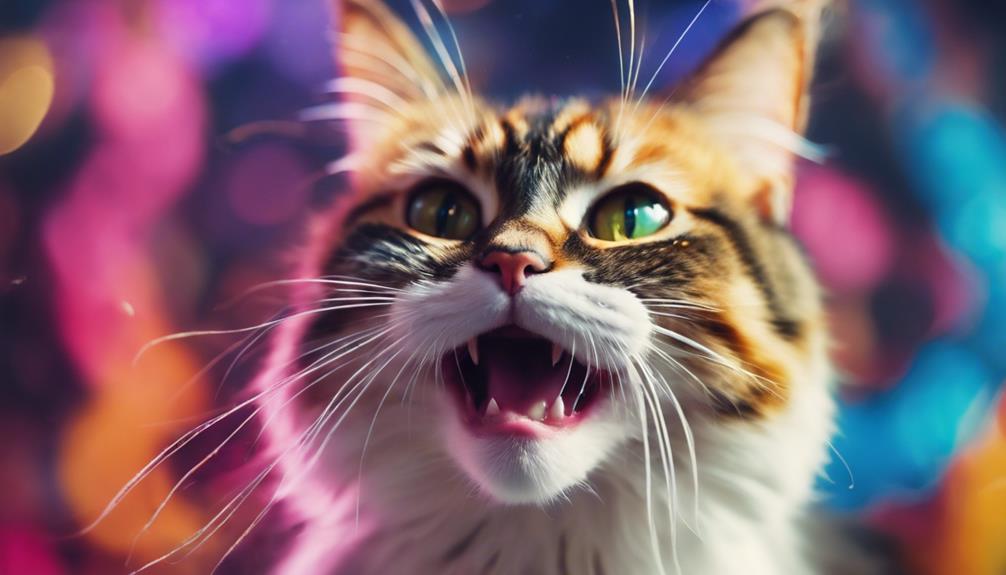
The presence of fillers in a cat's diet can contribute to the occurrence of smelly farts. Fillers like carbohydrates and vegetables can lead to increased gas production in cats, resulting in more odorous flatulence. Commercial cat foods with varying ingredients can also affect the smell of cat farts. While biologically appropriate diets may result in odorless poop and farts, certain diets rich in fillers can make cat farts and poop smell worse. It is essential to consider the impact of these fillers when selecting a diet for your feline friend to help manage fart smell effectively.
| Factor | Impact | Recommendation |
|---|---|---|
| Fillers in the diet | Increased gas production | Consider diets with fewer fillers |
| Commercial foods | Varying ingredients affect fart smell | Opt for high-quality cat foods |
| Biologically appropriate diets | Odorless poop and farts | Choose diets tailored to cat's needs |
Effects of Commercial Foods
As we explore the impact of commercial foods on cats, it becomes evident that the ingredients present in these products play a significant role in influencing the overall well-being of feline companions. When it comes to commercial cat foods, here are three key effects to consider:
- Nutritional Balance: Commercial foods may lack the necessary balance of nutrients essential for a cat's health, potentially leading to digestive issues and discomfort.
- Fillers and Additives: Some commercial cat foods contain fillers and additives that can be hard for cats to digest, resulting in increased flatulence and potential health problems.
- Quality Variability: The quality of ingredients in commercial foods can vary widely between brands, impacting the digestibility and overall impact on a cat's gastrointestinal system.
Biologically Appropriate Diets
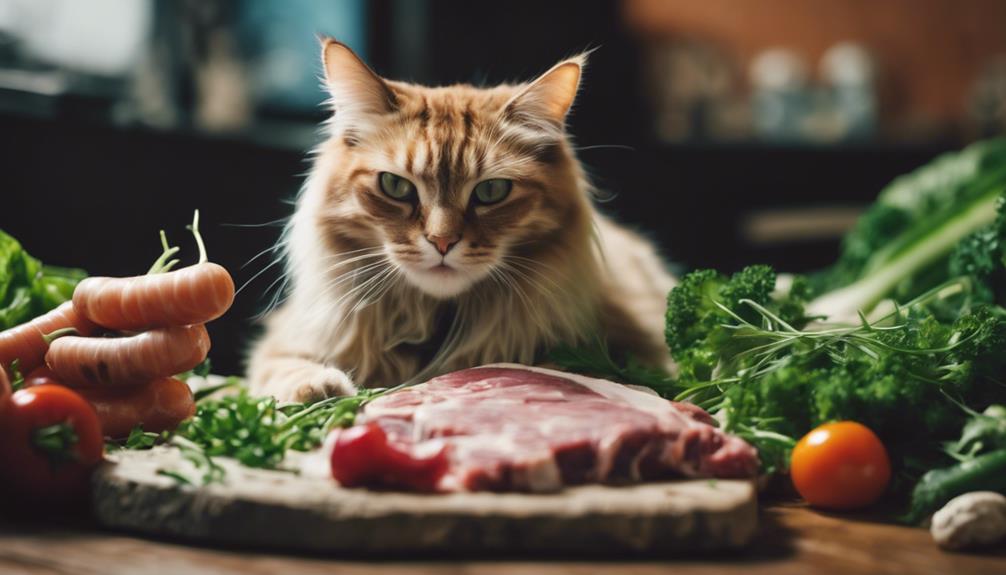
In considering feline nutrition, the importance of biologically appropriate diets cannot be understated. Cats, as obligate carnivores, thrive on diets rich in animal proteins. Biologically appropriate diets mimic a cat's natural prey, containing high-quality meat and minimal carbohydrates.
By feeding cats according to their biological needs, owners can promote optimal digestion and reduce the likelihood of smelly farts and poop. These diets help maintain a healthy balance of gut bacteria, crucial for overall well-being.
When selecting cat food, prioritize options that align with a cat's carnivorous nature to support their digestive health and minimize odors. Embracing biologically appropriate diets can lead to happier, healthier cats with less offensive flatulence and feces.
Odorless Farts and Poop
Exploring the realm of optimal feline nutrition, the focus shifts towards achieving a state where cats exhibit odorless farts and poop.
- Biologically Appropriate Diets: Cats benefit from diets that align with their carnivorous nature, leading to less smelly farts and poop.
- Balanced Nutritional Intake: Ensuring cats receive the right balance of nutrients can contribute to reduced odor in their gas and stools.
- Hydration Levels: Proper hydration plays a vital role in maintaining digestive health, which can influence the smell of a cat's waste.
Managing Farting in Cats
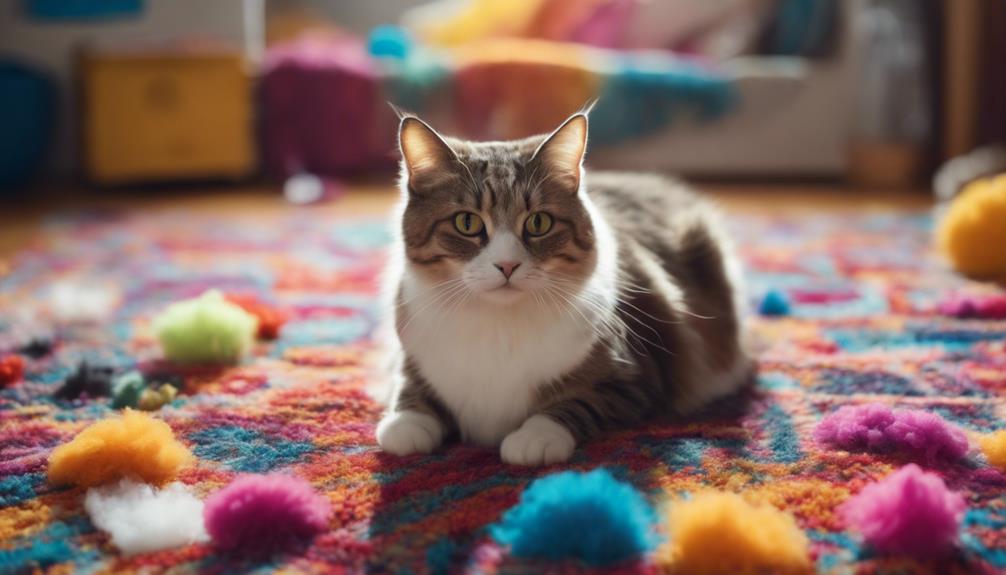
Effective management of cat farting involves understanding the underlying causes and implementing appropriate dietary and lifestyle adjustments to minimize discomfort for both the cat and its owner. Cats may fart due to swallowing air, excess gas from gut bacteria, stress, or dietary changes.
Normal, low to medium-stink farts a few times a day are common. Cats that consume air while eating may have less smelly farts. However, excessive or foul-smelling farts may necessitate a diet change. Gradual transitions in food can assist in resolving farting issues.
Consulting a vet before introducing probiotics or fiber supplements to a cat's diet is advisable. By addressing these factors, cat owners can help manage their pet's farting episodes effectively.
Diet Change for Smelly Farts
Considering the impact of dietary adjustments on reducing the occurrence of smelly farts in cats is crucial for pet owners seeking to improve their feline companion's comfort and well-being.
When aiming to alleviate your cat's smelly farts, specific dietary changes can make a noticeable difference:
- Reducing Fillers: Limiting the intake of fillers like carbs and veggies can help minimize the odor in your cat's farts.
- Switching to Biologically Appropriate Diets: Opting for diets that align with a cat's natural carnivorous needs can result in less smelly farts.
- Avoiding Certain Ingredients: Some cat foods contain components that may exacerbate fart smells, so selecting products without these can be beneficial.
Food Transition Tips
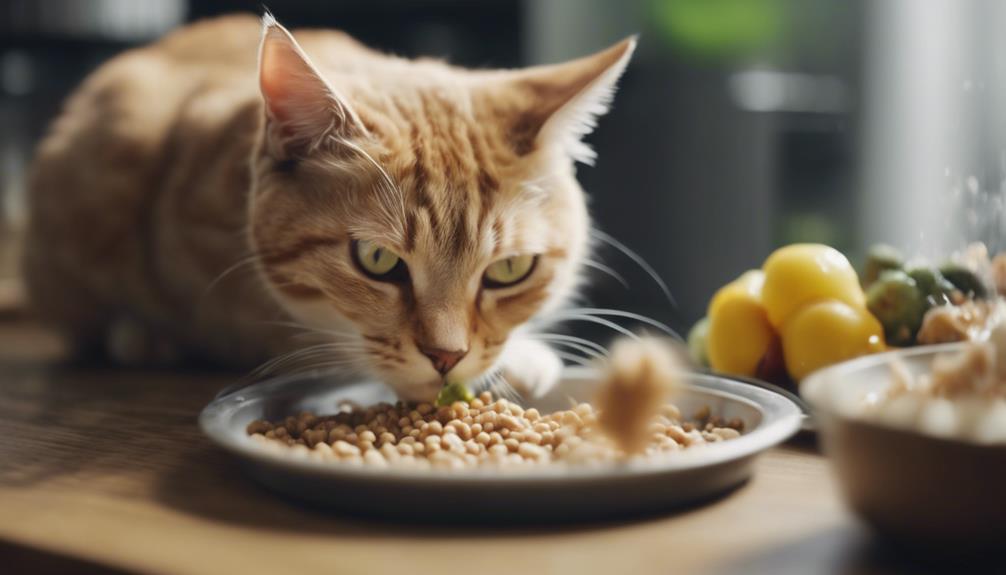
Transitioning your cat's food gradually is essential to prevent digestive issues and ensure a smooth adjustment to a new diet. When changing your feline friend's food, follow these food transition tips to help them adapt comfortably:
| Food Transition Tips | Benefits |
|---|---|
| Mix New & Old Food | Helps prevent stomach upset |
| Slowly Increase Ratio | Allows gut bacteria to adjust |
| Monitor Digestive Health | Ensures no adverse reactions |
| Consult Vet if Needed | Professional guidance for a seamless transition |
Probiotics and Fiber Consultation
When considering a consultation regarding probiotics and fiber for your cat, consulting a veterinarian is crucial for tailored advice and recommendations.
- Personalized Approach: A vet can assess your cat's specific needs, taking into account their age, health status, and dietary requirements to recommend the most suitable probiotics and fiber supplements.
- Monitoring Progress: Veterinarians can guide you on how to introduce probiotics and fiber into your cat's diet gradually, ensuring a smooth transition and monitoring any changes in your cat's digestion and overall well-being.
- Health Benefits: Expert advice on probiotics and fiber can help improve your cat's gut health, digestion, and reduce the likelihood of excessive flatulence, promoting a happier and healthier feline companion.
Additional Pet Farting Insights
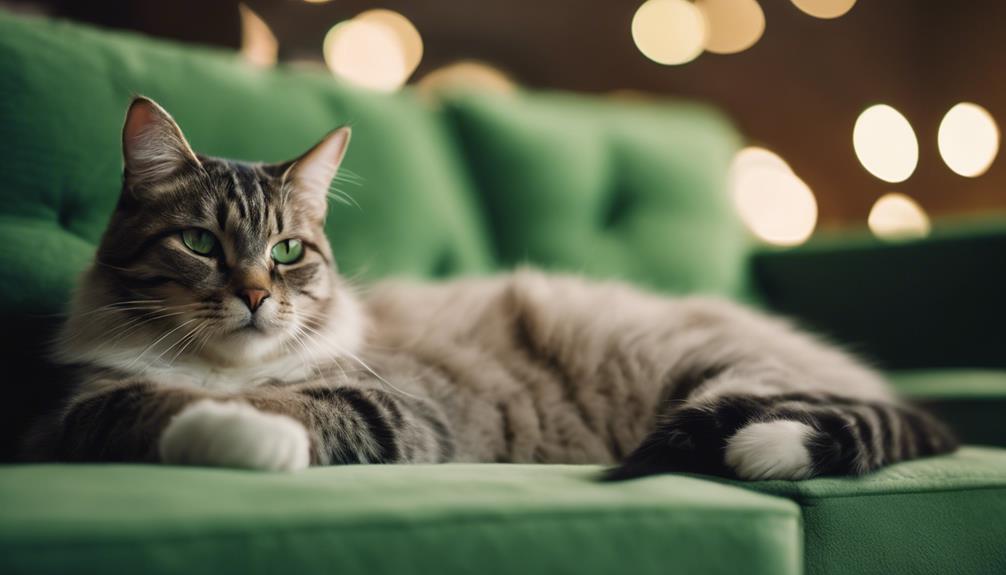
Exploring further nuances of pet flatulence provides valuable insights into understanding and managing this common phenomenon in our furry companions. When it comes to additional pet farting insights, it's essential to consider various factors that can influence the frequency and intensity of flatulence in our beloved pets. Below is a table summarizing some key points to keep in mind:
| Factors Affecting Pet Flatulence | Implications | Management Tips |
|---|---|---|
| Diet | Can affect fart smell | Consider dietary adjustments |
| Stress levels | Can increase farting | Ensure a calm and stable environment |
| Age | Seniors may fart more | Monitor older pets closely |
| Health conditions | May lead to excessive gas | Consult a veterinarian if concerned |
Understanding these factors can help pet owners better navigate and address their pet's flatulence issues efficiently.
Frequently Asked Questions
Can Stress and Anxiety in Cats Lead to Increased Farting?
Stress and anxiety in cats can indeed lead to increased farting. These emotional factors, alongside immature immune systems in kittens or weak immune systems in seniors, contribute to excess gas production. Consulting a vet for guidance is advisable.
How Can a Cat's Immature Immune System or Weak Immune System in Seniors Affect Farting Frequency?
A cat's immature immune system in kittens or weakened immunity in seniors can lead to increased farting due to digestive sensitivity. Stress, diet changes, or health issues may exacerbate flatulence. Consult a vet for guidance on managing these factors.
Are There Specific Health Issues That Can Cause Excessive Gas in Cats?
Excessive gas in cats may indicate health issues such as dietary intolerances, gastrointestinal problems, or infections. Consulting a veterinarian is crucial to diagnose and address any underlying medical conditions that could be causing abnormal farting in cats.
How Does the Presence of Fillers Like Carbs and Veggies in Commercial Cat Foods Impact Fart Smell?
Fillers like carbs and veggies in commercial cat foods can lead to smelly farts. Cats, obligate carnivores, struggle to digest these additives properly. Opting for biologically appropriate diets can reduce odors. If excessive, consult a vet for dietary adjustments.
Is It Recommended to Consult a Vet Before Making Any Changes to a Cat's Diet to Address Farting Issues?
Consulting a vet before altering a cat's diet for farting issues is advised. Vets can assess underlying health concerns and recommend appropriate dietary adjustments. Professional guidance ensures the cat's well-being and addresses potential digestive issues effectively.
Can a kitten’s diet cause them to fart?
When considering kittens’ eating habits timeline, it’s important to note that their diet can influence their digestive system. Certain foods, like dairy products or low-quality cat food, may cause kittens to experience flatulence. It’s essential to monitor their diet and provide them with high-quality, balanced meals to avoid digestive issues.
Conclusion
In conclusion, the frequency of cat flatulence, influenced by factors such as diet and gut microbiota, sheds light on the complex world of feline physiology. Understanding the causes and potential solutions for cat farting can help pet owners better care for their furry companions.
By considering dietary adjustments, probiotics, and other strategies, managing and reducing cat flatulence can lead to a more harmonious relationship between pets and their owners.




